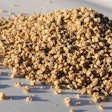How to improve the diets of broiler breeder chickens is being investigated by researchers at Scotland's Rural College (SRUC), Newcastle University, The Roslin Institute and Biomathematics & Statistics Scotland (BioSS). The groups will study birds' behavior and brain activity to establish the best possible diet to keep them feeling full for longer. The work is being supported with a £400,000 (US$659,000) grant from the Biotechnology and Biological Sciences Research Council.
SRUC notes that the life of broiler breeder chickens has long been a welfare issue for all those connected with poultry production. Growth of broiler breeders up to 20 weeks is important because if their access to food is not controlled, they might grow to be obese as adults, which can lead to health problems. However, if their diet is too restrictive, the birds are left feeling hungry, which has always troubled those involved in animal welfare.
Dr. Rick D'Eath, who will be leading the project at the SRUC explains: "The research will assess how the chickens are affected by different types and amounts of food. We need to understand how best to rear them from chick to adult, keeping them healthy without over or under feeding them."
A potential solution to the problem of hunger resulting from restricted feeding in broiler breeders is adding indigestible, high-fiber ingredients to their feed. These can potentially make the chickens feel more satisfied and, as they are very low energy, they should not result in excessive weight gain. However, having a physically full gut is only one part of feeling satisfied and not hungry.
The project will also investigate the ways in which different diets affect signs of hunger in the brain, the gut and in the birds' behavior, in order to better understand whether they genuinely feel less hungry when fed the newly designed diets. SRUC's team will assess the behavior aspect while The Roslin Institute and Newcastle University will provide expertise on brain and gut physiology, with experimental design advice and analysis provided by BioSS.
Dr. D'Eath adds: "At the end of this three-year project, we hope to inform and influence future poultry industry guidance on feeding broiler breeders which could improve the welfare of millions of chickens around the world."






